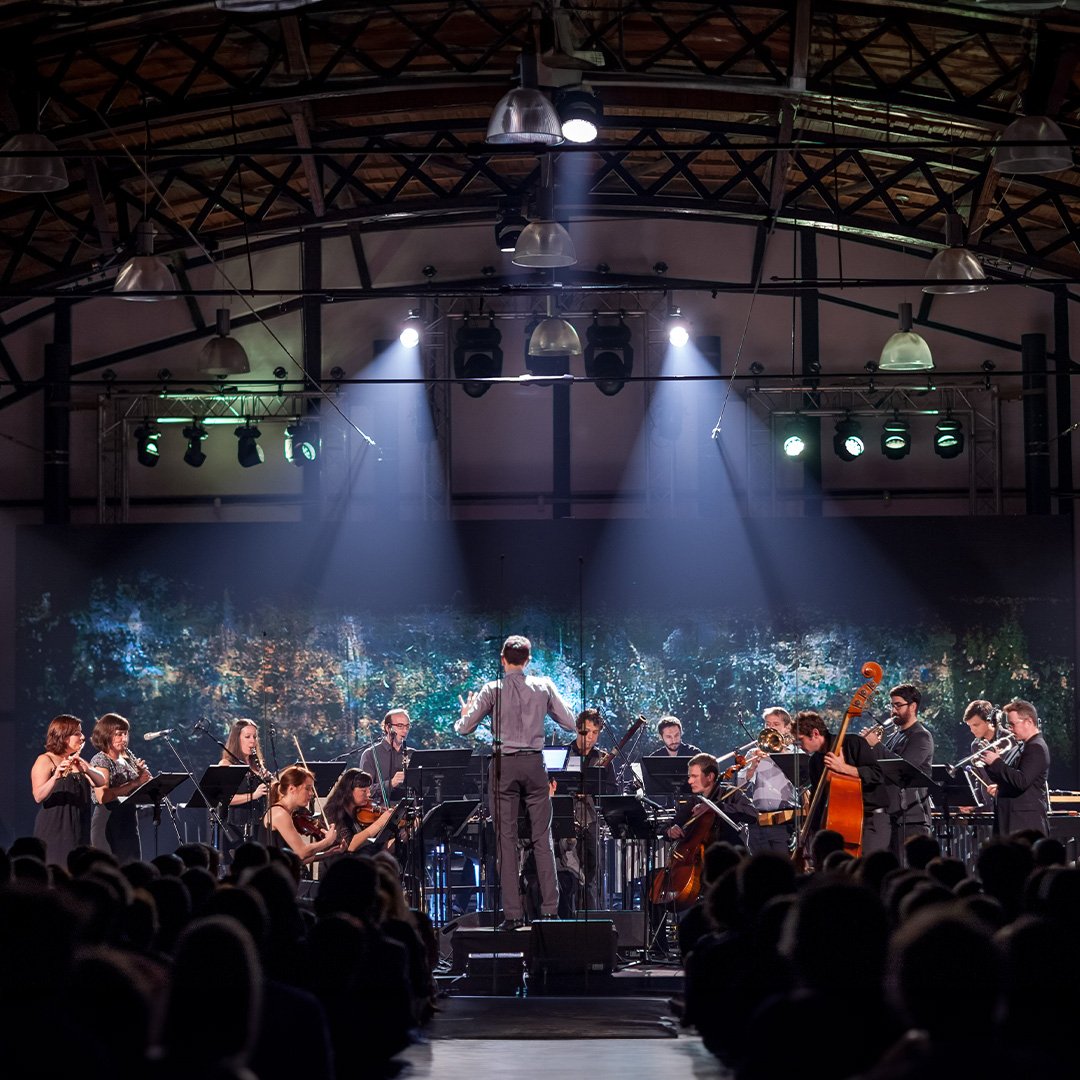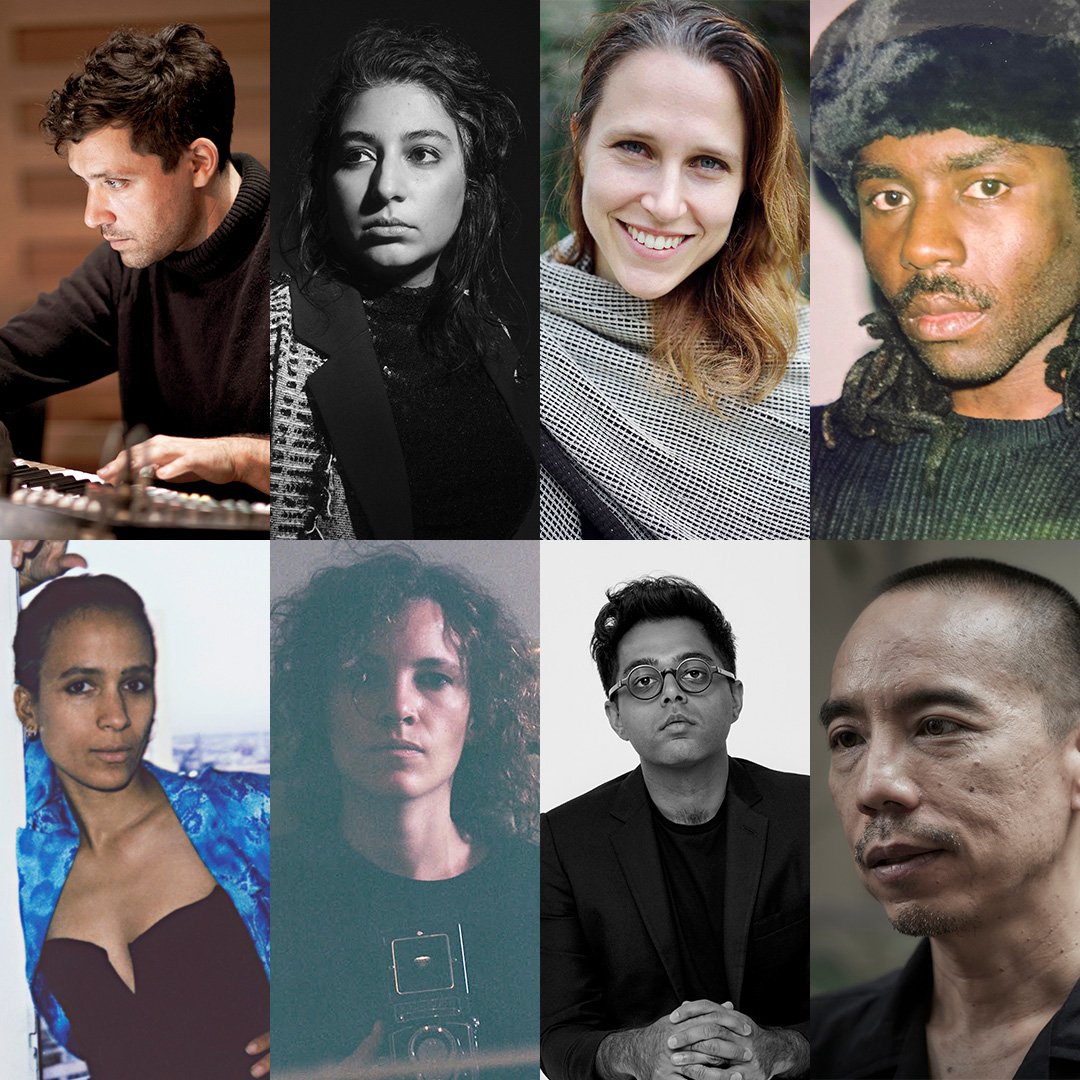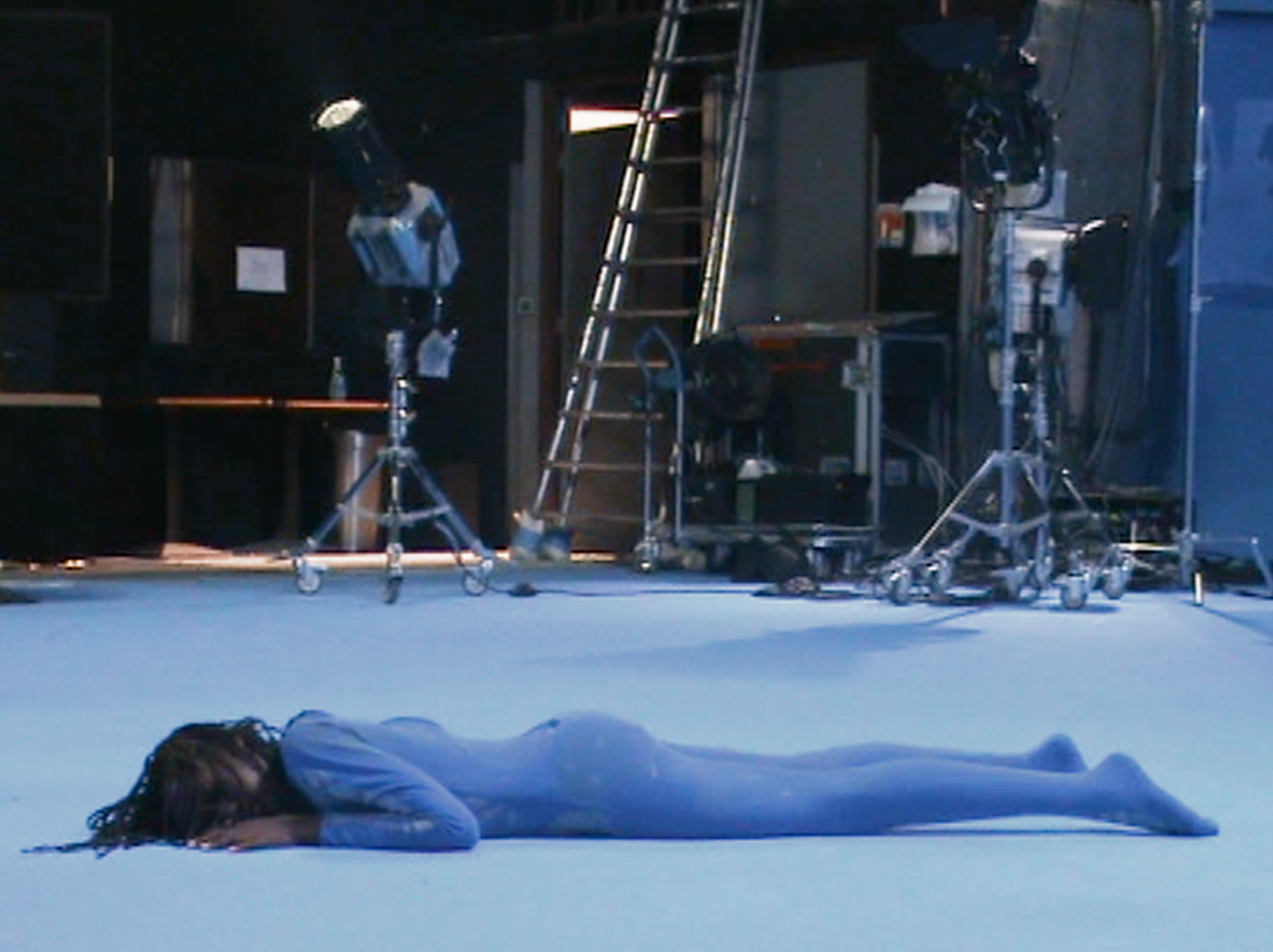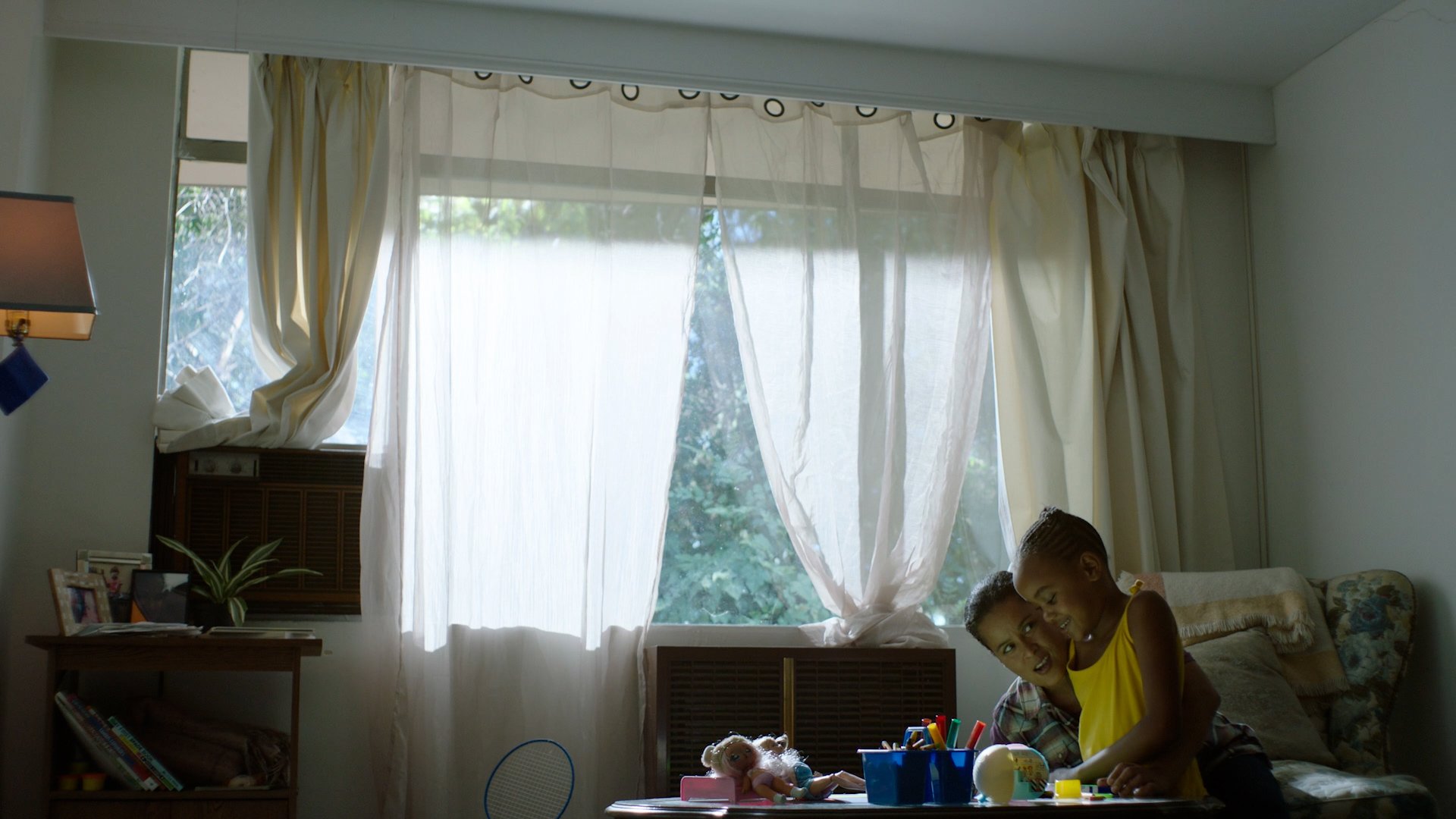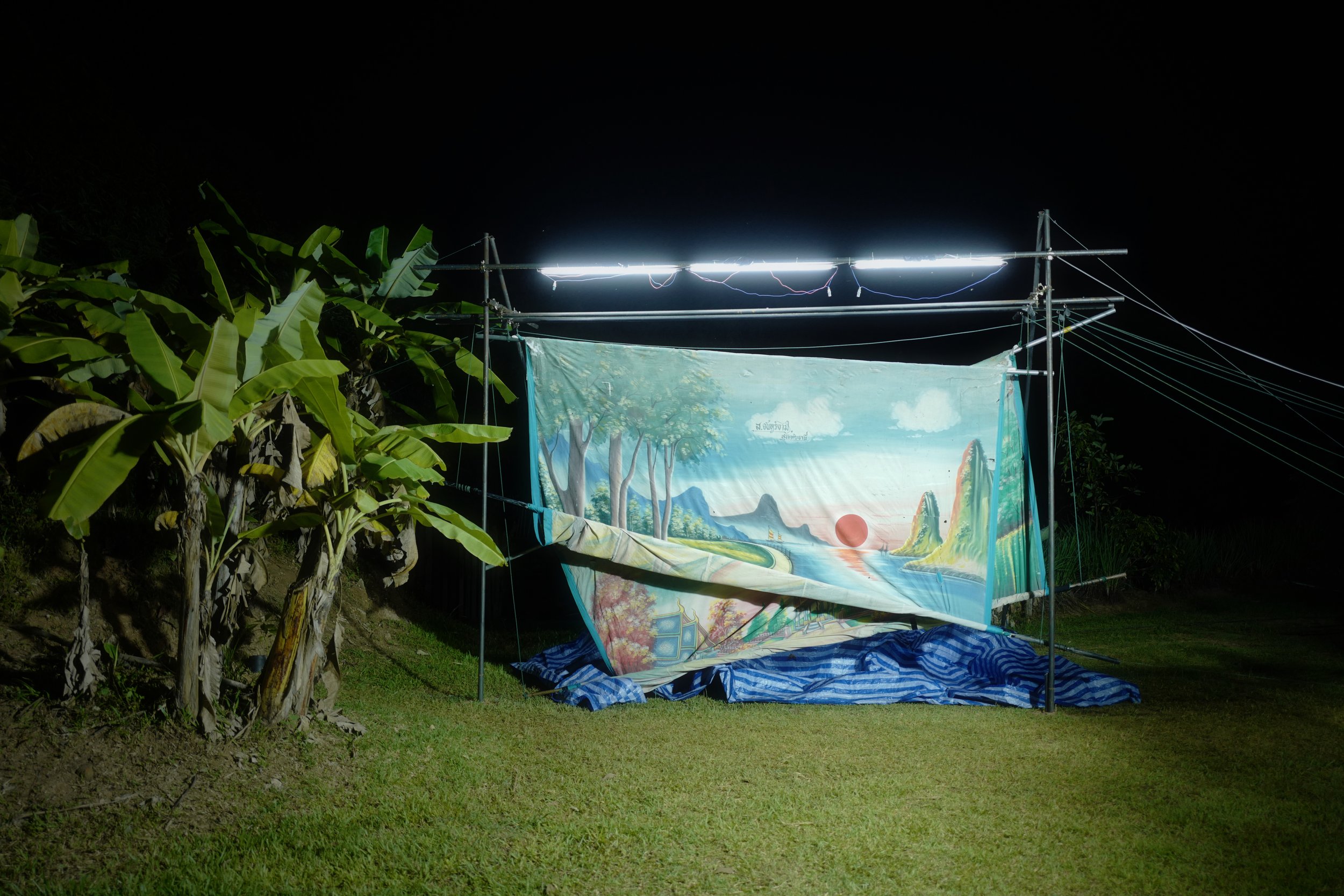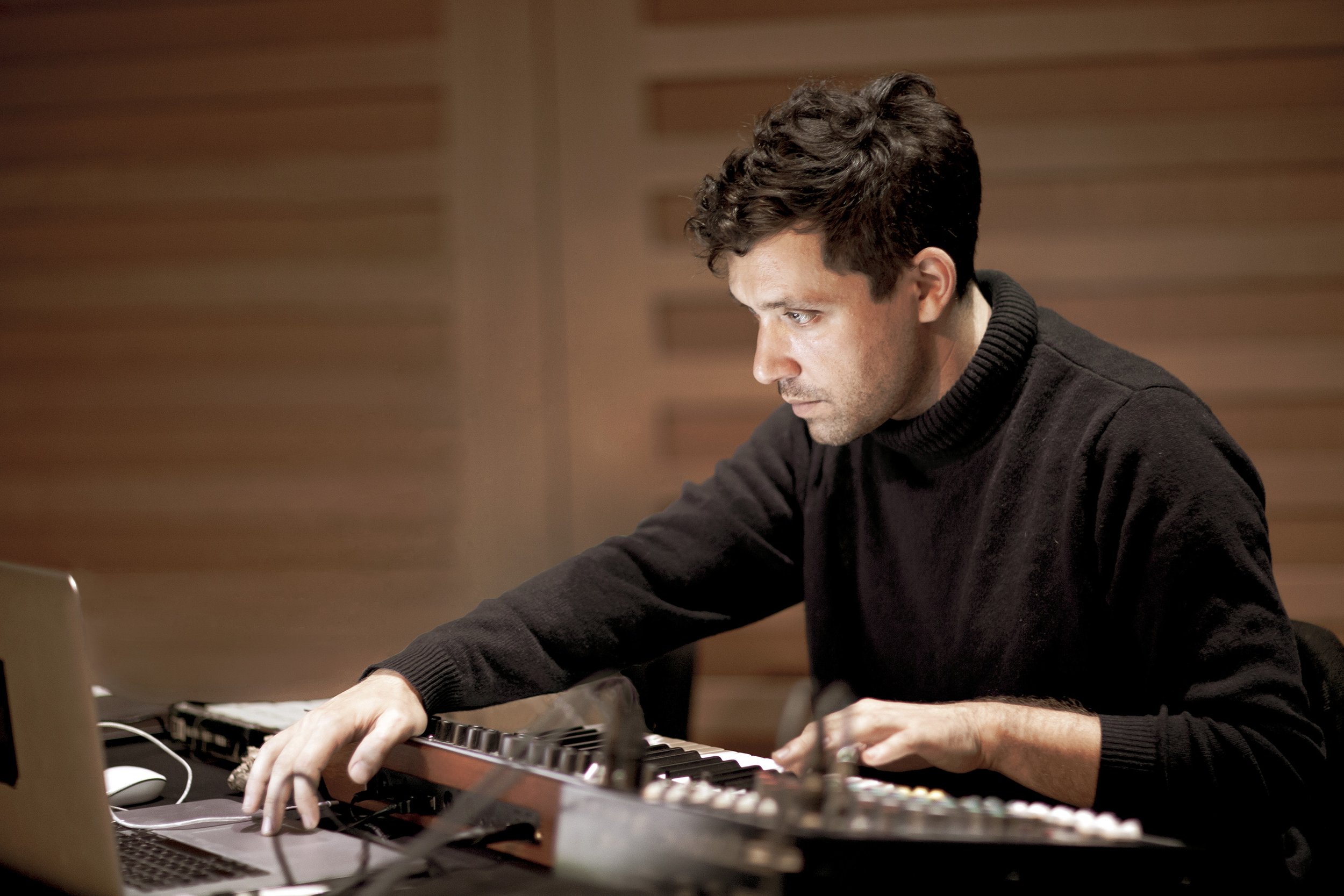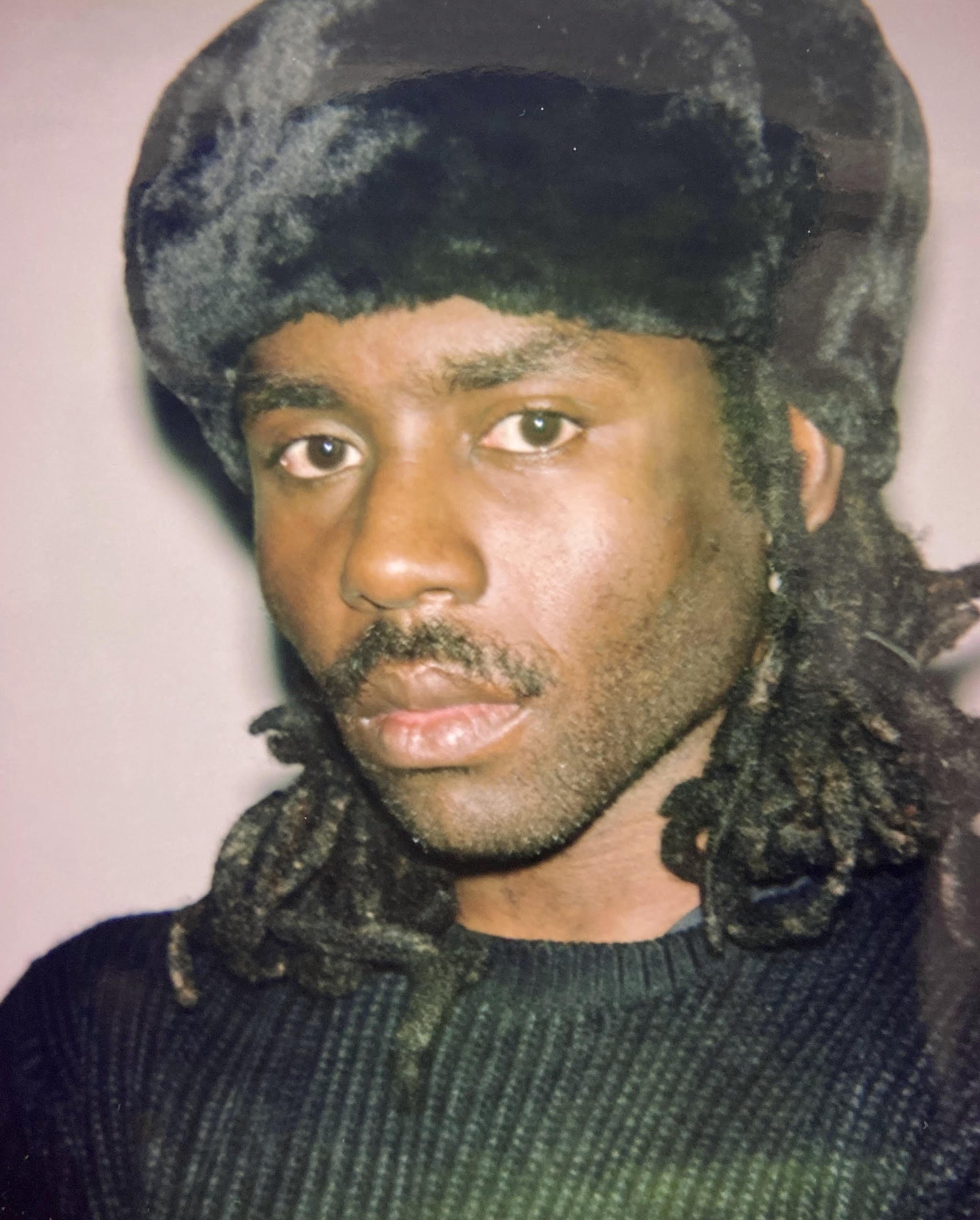Sun Dogs: Filmmaker and Composer Pairings
With Alarm Will Sound
Music by Devonté Hynes, Arooj Aftab, Daniel Wohl and Rafiq Bhatia
Films by Apichatpong Weerasethakul, Josephine Decker, Mati Diop, and Manon Lutanie
Nov 16, 2024 // 7:30 pm
Scheidegger Center for the Arts (Saint Charles, MO)
Get Tickets
Nov 18 & 19, 2024 // 7:30 pm
Brooklyn Academy of Music (Brooklyn, NY)
Get Tickets
Nov 21, 2024 // 7 pm
Carlson Family Stage, Northrop (Minneapolis, MN)
Get Tickets
Nov 23, 2024 // 8 pm
The Nimoy Theater, Center for the Art of Performance UCLA (Los Angeles, CA)
Sold Out
Sun Dogs brings together inspired composer and filmmaker pairs to create short-format films with new music for live orchestra, exploring how stories can be told (both musically and visually) from equal footing. These singular films are accompanied by the “unusually versatile, reliably exhilarating new-music ensemble" (The New York Times) Alarm Will Sound, with newly-arranged scores for the group. An atmospheric phenomenon created by refracted light, a sun dog is striking proof that, when natural conditions are right, familiar elements can shift the way we see the world. The series' prismatic collaborations similarly allow us glimpses at another realm.
Program:
Prelude for an Old Friend*
Composed by Daniel Wohl
On Blue
Rafiq Bhatia, composer
Apichatpong Weerasethakul, filmmaker
Naked Blue
Devonté Hynes, composer
Mati Diop & Manon Lutanie, co-directors
Rise, Again
Arooj Aftab & Daniel Wohl, co-composers
Josephine Decker, filmmaker
*Included in the Minneapolis program at Northrop only
Rise, Again, Naked Blue, and On Blue were commissioned by the Cincinnati Symphony Orchestra and FotoFocus as part of the 2022 FotoFocus Biennial. Support for new arrangements was made possible by Tim and Calli Sullivan, Dr. Thomas von Sternberg and Eve Parker. Prelude for Old Friend was commissioned by Northrop as part of the 2024 Liquid Music | Northrop Series.
about the artists
Alarm Will Sound is a 20-member touring ensemble led by Artistic Director Alan Pierson that commissions, performs, and records innovative works by established and emerging composers, especially works that incorporate theatrical and multimedia elements by choreographers, visual artists, designers, and directors. Its wide ranging artistic vision looks beyond genre—electronic vs. acoustic, high-modernist vs. pop-influenced, conventional classical concert vs. multimedia experience.
Born in Paris and now residing in Los Angeles, Daniel Wohl is a composer who blends electronics with acoustic instrumentation to often "surprising and provocative effect" (NPR). HIs multifaceted output ranges from intimate music for soloists to immersive electronic pieces, music for film and television, chamber ensembles, and works for large orchestra. He has received critical praise as one of his generation’s "imaginative, skillful creators" (New York Times) making music that is "beautiful...original" (Pitchfork).
Performances of his electroacoustic concert music have been held at the Broad Museum, MASS MoCA, the Hollywood Bowl, Carnegie Hall, The Barbican, Sadler's Wells, and MoMA PS1, by orchestras such as the Cincinnati Symphony, the Los Angeles Philharmonic, Alarm Will Sound, The London Contemporary Orchestra, ensembles from the San Francisco Symphony and the Chicago Symphony Orchestra, the Bang on a Can All-Stars, and So Percussion among others. An enthusiastic collaborator, Daniel has worked on projects with artists such as Jóhann Jóhannsson, Son Lux, Arooj Aftab, and Laurel Halo. He recently composed the music for the Luna Luna exhibit, a showcase of the world’s first art amusement park, featuring artworks by Jean-Michel Basquiat, Keith Haring, Dali, David Hockney, and others.
His passion for composing for film and television has led him to work on a number of media projects with directors such as Luca Guadagnino, Patty Jenkins, Sanaa Lathan, Josephine Decker and Morgan Neville. His most recent album Etat was released on Nonesuch and New Amsterdam Records in 2019. A graduate of the doctoral program at the Yale School of Music, Daniel studied primarily with composer David Lang.
Over the last few years, Grammy award winning artist, Arooj Aftab, has emerged as one of the most innovative composers and vocalists of our time, a true visionary whose architectural compositions unfurl into moving reflections on love and loss. Her work mellifluously blends a wide array of genres, from jazz to minimalism to Pakistani semi-classical, and she sings with such intentionality and focus that it sounds like she is chiseling every word out of marble.
Her incredible work has resonated with listeners across the globe: She has been named one of NPR’s Top 100 composers, and has been featured on several best concerts lists, including one by The New York Times. Her 2021 Vulture Prince album was met with critical acclaim from The Guardian, Time Magazine, Pitchfork, Rolling Stone, The Los Angeles Times, and The New York Times. Aftab has performed at major international music festivals including Coachella, Glastonbury, Primavera Sound Barcelona, Roskilde Festival, and Montreal Jazz Festival. She has also performed at Performance Art Centers such as The Metropolitan Museum of Art, The Lincoln Center for Performing Arts, and The Broad. Aftab is a 2023 United States Artists Fellow and a recipient of the Vilcek Prize for Creative Promise in Music.
Aftab is inspired by the poetics of the ordinary – the grandeur of a centuries old tree, the glow of the moon, the yearning floating in the air at dusk, the drama of an incomplete love affair - these inspirations are the mirror to her music, as she witnesses the world. The emotions Aftab conveys feel intimate and familiar, like they were pulled from a forgotten dream. But her musical skill is so precise and her voice is so singular that the music sounds like nothing that has ever come before it.
Josephine Decker is a filmmaker committed to collaboration, poetry, play, cinema and the new genres and personal transformations that emerge from their mixing. Her work focuses on women’s interiority and sexuality.
She is currently adapting a novel by Max Porter into a body horror feature film Dead Papa Toothwort with BBC and The Bureau. Her project Swamplandia! based on the best-selling book by Karen Russell and in collaboration with the Miccosukee Nation is set up with FilmNation and will shoot in January in Florida. She’s also adapting a short story by Kelly Link with Tango.
Her feature The Sky is Everywhere (A24/Apple TV Plus, adapted from Jandy Nelson's YA novel) came out Valentine's Day 2022 and was a New York Times Critic’s Pick. Her previous feature film Shirley (Neon/Hulu), starring Elisabeth Moss and Odessa Young, won Sundance 2020’s U.S. Dramatic Special Jury Award for Auteur Filmmaking and centers around two women whose subtly erotic friendship is both liberating and destructive.
Josephine’s work tends to bend the space between imagination and reality. Her feature film Madeline’s Madeline (Oscilloscope/Hulu/Showtime) follows an unstable teenager as she is seduced into a large role in a theater company. The film’s visceral cinematography, editing and sound design thrust the audience into the ever-shifting first-person perspective of her main character Madeline. Madeline’s Madeline, scripted through a devised process with ten actors, played Sundance, Berlinale and scores of festivals worldwide, was hailed as a “mind-scrambling masterpiece” and was nominated for Best Picture at IFP’s Gotham Awards and for two Independent Spirit Awards. Said to be ushering in a “new grammar of narrative” by The New Yorker, Josephine premiered her first two narrative features at the Berlinale Forum 2014 to critical acclaim.
Josephine also explores collaborative storytelling via TV directing, documentary making, performance art, accordion-playing, acting, teaching at places like CalArts and Princeton University and leading artist residencies with the School of Making Thinking.
Since 2022, she has been making a documentary in collaboration with teen mothers in Dallas, Texas. Dallas offers limited access to contraception and health insurance, housing assistance that has been priced out by Dallas’ booming real estate market, and has the highest repeat teen pregnancy rate in the country. The teen mothers Josephine works with improvise, write and act in short films that create the backbone of the doc.
The New York Times proclaims guitarist, composer, and producer “Rafiq Bhatia is writing his own musical language,” heralding him as “one of the most intriguing figures in music today.” A guitarist, composer, producer, and sound artist “who refuses to be pinned to one genre, culture or instrument,” Bhatia “treats his guitar, synthesizers, drum machines and electronic effects as architectural elements,” the Times writes. “Sound becomes contour; music becomes something to step into rather than merely follow.”
Bhatia’s 2018 album Breaking English finds a visceral common ground between ecstatic avant-jazz, mournful soul, tangled strings and building-shaking electronics, resulting in a "stunningly focused new sound" (Chicago Tribune) that resembles “science fiction on a blockbuster scale” (Washington Post). 2020’s Standards Vol. 1 (EP) renders repertoire from the American songbook “completely deconstructed, infused with brand new textures and electronic effects, dreamlike and beautiful” (BBC).
More recently, the painstaking sound design of Bhatia’s own projects has inspired other artists to recruit him as a producer and mixing engineer. 2020 saw the release of pianist Chris Pattishall’s debut album, Zodiac, featuring the music of Mary Lou Williams with production and mixing by Bhatia. The New York Times hailed it as “a startling achievement,” while The Wire writes, “the production successfully achieves an impression of solid forms melting and reconfiguring, ethereal transitions precipitating dramatic and frequent shifts of mood and manner… an audible space opening up between the routine and the magical.”
Since 2014, Bhatia has been a member of the band Son Lux. Together, they have released three albums and numerous EPs, and given over 500 performances worldwide. Most recently, they scored the Academy Award-winning film Everything Everywhere All At Once for A24 which was nominated for Best Original Score at the Oscars and BAFTAs, and included collaborations with David Byrne, Mitski, Moses Sumney, Randy Newman, and more.
Bhatia has presented his music live in dozens of performances across three continents. He has been commissioned by the Kronos Quartet, Cincinnati Symphony, Walker Art Center, Liquid Music, Newfields, The Jazz Gallery, Toledo Museum of Art, and more. Bhatia has collaborated with Arooj Aftab, Michael Cina, Dave Douglas, Vijay Iyer, Okkyung Lee, Billy Hart, Helado Negro, Cécile McLorin Salvant, Moses Sumney and many others.
Bhatia is a Jerome Foundation Composer/Sound Artist Fellow and adjunct faculty of the New School’s Performer-Composer Master of Music program. He lives in Brooklyn, New York.
Apichatpong Weerasethakul is recognized as one of the most original voices in contemporary cinema. His previous seven feature films, short films, installations and his recent live performance have won him widespread international recognition and numerous awards, including the Cannes Jury Prize in 2021 for Memoria, his first film shot outside of Thailand, featuring Tilda Swinton. He also won Cannes Palme d’Or in 2010 with Uncle Boonmee Who Can Recall His Past Lives. His Tropical Malady won the Cannes Competition Jury Prize in 2004 and Blissfully Yours won the Cannes Un Certain Regard Award in 2002. Syndromes and a Century (2006) was recognised as one of the best films of the last decade in several 2010 polls. Mysterious Object at Noon (2000), his first feature, has been restored by Martin Scorsese’s World Cinema Foundation.
Born in Bangkok, Apichatpong grew up in Khon Kaen in north-eastern Thailand. He began making films and video shorts in 1994 and completed his first feature in 2000. He has also mounted exhibitions and installations in many countries since 1998 and is now recognised as a major international visual artist.
His art prizes include the Sharjah Biennial Prize (2013) the prestigious Yanghyun Art Prize (2014) in South Korea and the Artes Mundi Award (2019). Lyrical and often fascinatingly mysterious, his film works are non-linear, dealing with memory and in subtle ways invoking personal politics and social issues. Working independently of the Thai commercial film industry, he devotes himself to promoting experimental and independent filmmaking through his company Kick the Machine Films, founded in 1999, which also produces all his films. His installations have included the multi-screen project Primitive (2009), acquired for major museum collections (including Tate Modern and Fondation Louis Vuitton, Paris), a major installation for the 2012 Kassel Documenta and most recently the film installations Fireworks (Archive) (2014), Invisibility (2016), Constellations (2018), A Minor History (2021, 2022), and Moving Pictures (2023). Apichatpong lives and works in Chiang Mai, Thailand.
Raised in England, Devonté Hynes started in the punk band Test Icicles before releasing two orchestral acoustic pop records as Lightspeed Champion. Since 2011, Hynes has released four solo albums under the name Blood Orange – Coastal Grooves, Cupid Deluxe, Freetown Sound, and Negro Swan, as well as 2019’s Angel’s Pulse mixtape and his most recent EP, Four Songs in 2022, all of which have been met with critical acclaim. His work has explored the complexities and ambiguities of 21st century identity, delving into memory, trauma, depression and anxiety, as well as the triumphs of vulnerable communities, including people of color and queer and trans communities, and where they intersect.
In addition to his solo work, Hynes has collaborated with pop music superstars including Mariah Carey, A$AP Rocky, Solange, Blondie, Paul McCartney, Tame Impala, Robyn, and Sky Ferreira. Hynes's film and television credits include the scores for Melina Matsoukas’ Queen and Slim, Gia Coppola's Palo Alto, Luca Guadagnino’s We Are Who We Are, Rebecca Hall’s Passing, and Rodrigo Garcia's In Treatment. He also recently scored the music for the Broadway production, Job, and is a frequent collaborator with the fashion house, Marni.
As a performer and scholar of contemporary music, Hynes has long specialized in the work of Julius Eastman, performing the composer's work internationally and recently featured on Wild Up's Grammy nominated anthology of the composer's works. Hynes also provided the forward to the French edition of Gay Guerrilla, a collection of essays about Eastman's life and music. Hynes has also performed the music of Philip Glass alongside the composer, and was recently featured in a ten-part BBC series Composed, about the breadth of classical music.
Hynes's symphonic and instrumental music has been performed and commissioned by the London Symphony Orchestra, LA Philharmonic, and Cincinnati Symphony Orchestra, among others, and championed by artists including Seth Parker Woods, Adam Tendler, and Third Coast Percussion, who in 2020 were nominated for a Grammy in the category of Best Chamber Music or Small Ensemble Performance for their recording of Hynes's work, Fields. Hynes's piano concerto, Happenings, saw its premiere at New York’s Little Island Festival in 2021, and has been featured, along with his cello concerto, Origin, multiple chamber works, and his symphony Naked Blue, in a series of Selected Classical Works programs, which have appeared at Sydney Opera House, Los Angeles's Ford Theatre, London's Barbican Centre, and New York's Brooklyn Academy of America.
Mati Diop is a French-Senegalese filmmaker born in Paris in 1982. Since her start as a visual artist in the early 2000s and her leading role in Claire Denis’ 35 Shots of Rum (2008), she has built an eclectic body of work which includes her award-winning short films Atlantiques (2009), Big in Vietnam (2010), Snow Canon (2011), A Thousand Suns (2013), and In my room (2020).
With her first feature film Atlantics (2019), winner of the Grand Prix at the Cannes Film Festival, she has established herself as one of the leading figures of international auteur cinema and a new wave in African and diasporic cinema. Her nomadic, romanesque and political films challenge the boundaries between genres and formats like a reflection of her mixed identity. Selected in the official competition at the 74th Berlinale, Dahomey (2024), her second feature film shot in Benin about the restitution of royal treasures looted during French colonization, pursues her artistic commitment on the African continent.
Manon Lutanie is a publisher and filmmaker based in Paris. Her short films have screened internationally at e-flux, the Cincinnati Symphony Orchestra, Festival du Nouveau Cinéma, ICA London, FIAC Hors les murs, Documenta Madrid, FIDMarseille, Mucem, Indie Lisboa, and elsewhere. In 2009, she founded the independent press Éditions Lutanie, through which she has published books by Zoë Lund, Rene Ricard, Walter De Maria, Michael Heizer, Marianne Vitale, and more. She is a member of P.A.I.N.–a non-profit acting to end the overdose epidemic and the stigma of addiction.

